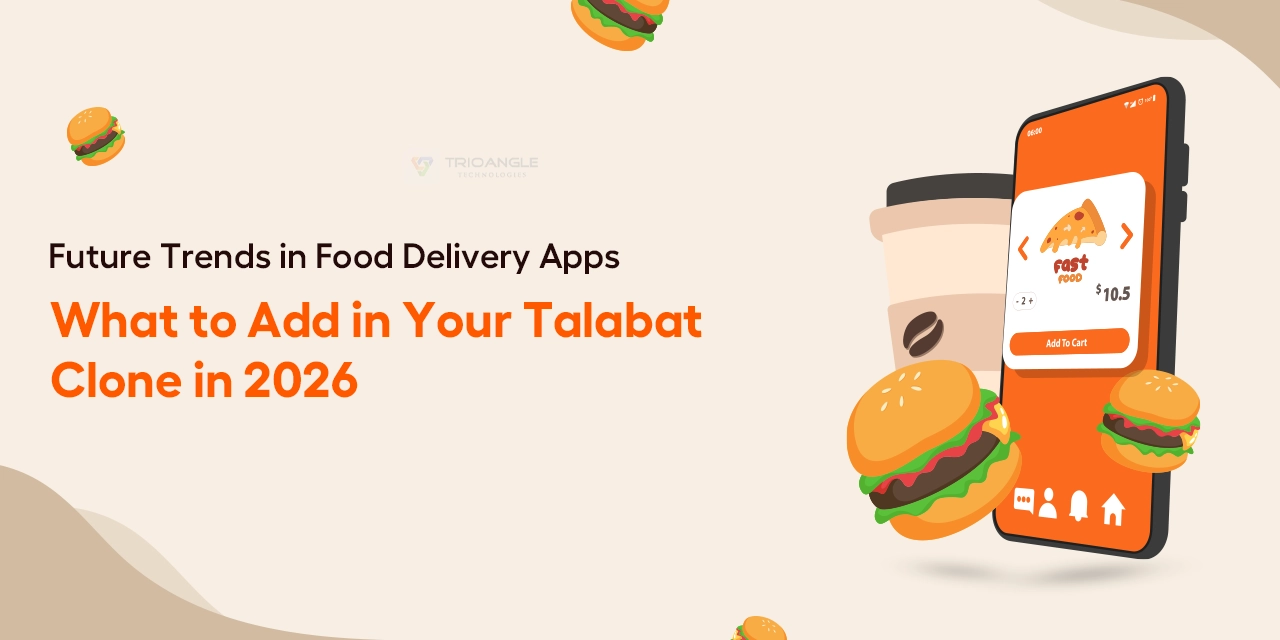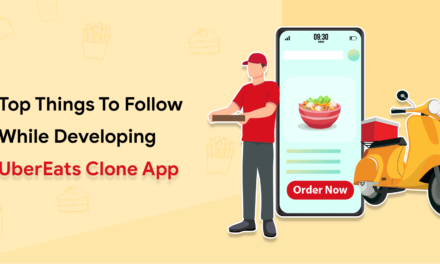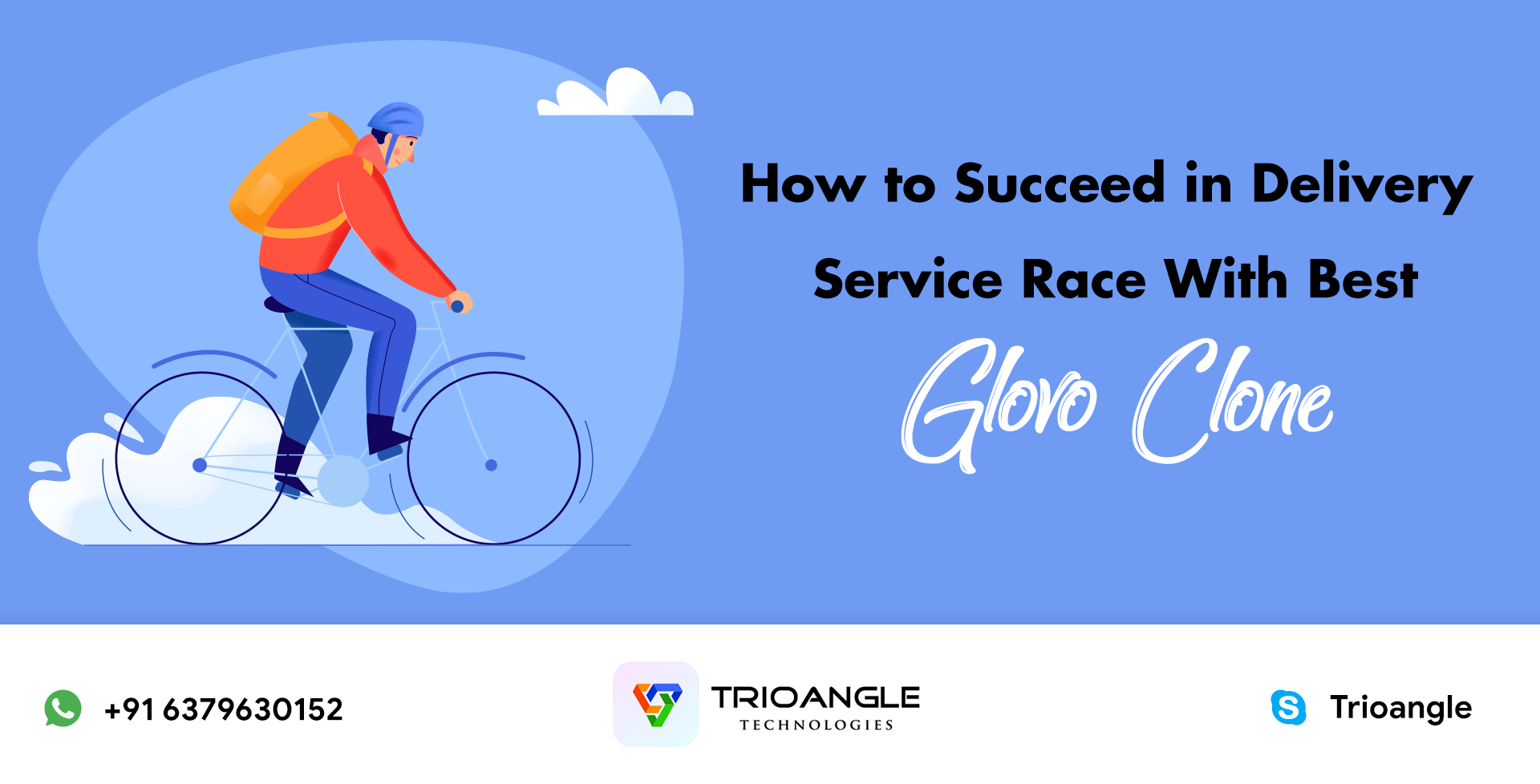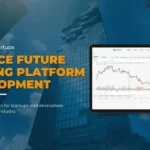Are you looking for a perfect food delivery app? Whether you’re craving your favorite food or something completely new, a good delivery app makes ordering tasty meals easy, quick, and fun.
From browsing menus to tracking your order, these apps bring deliciousness right to your doorstep with just a few taps. Ready to Explore? Let’s dive into what makes these apps a game-changer in satisfying your hunger!
Therefore, this blog covers the top future trends in food delivery apps for 2026, such as drone delivery tactics, AI-based recommendations, and how to add them to your Talabat clone.
The Rapid Evolution Of Food Delivery Platforms
Introduction of smart tech like AI and GPS behind the scenes, getting your favorite meal faster and easier has become the new normal.
As technology continues to evolve, food delivery platforms aren’t just a craze; they are becoming a major part of how we eat and live every day.
Therefore, it is noted that, with continued technological innovation shaping logistics and consumer behaviour, food delivery platforms are likely to remain a permanent and growing fixture in how people eat and interact with food services.
The value of India’s online food delivery sector stood at $43.78 billion in 2024 and is anticipated to surge to $81.91 billion by 2028
Challenges Of Existing Food Delivery Apps
Challenges faced by the existing food delivery apps are listed as follows,
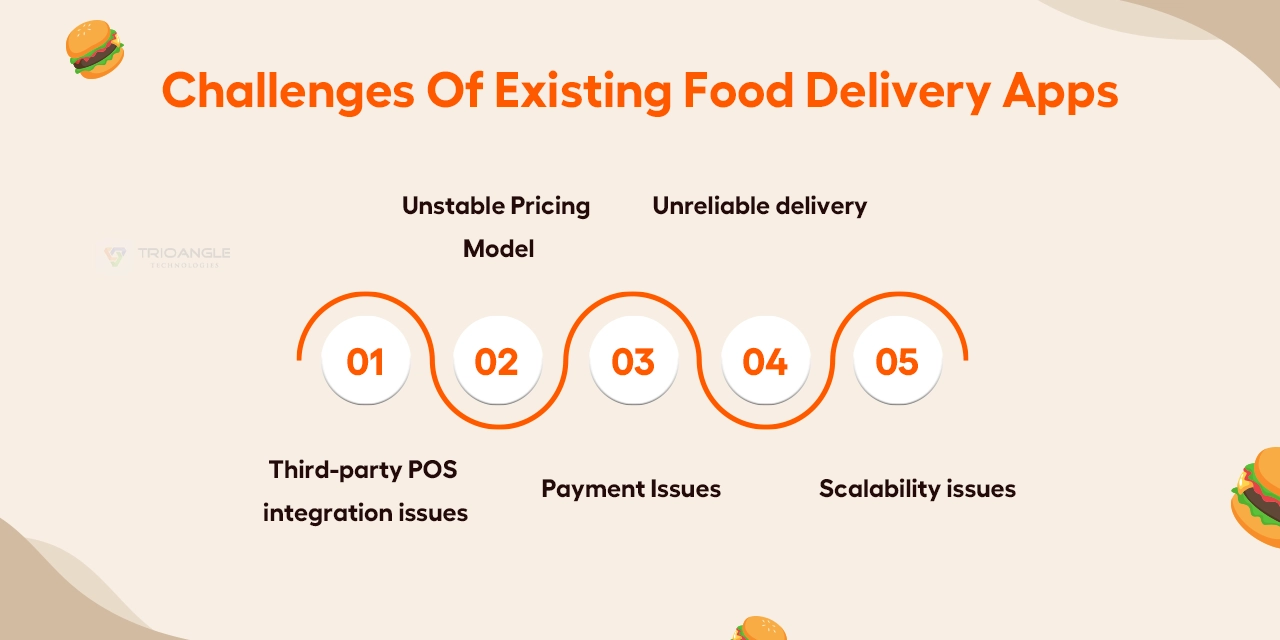
Third-party POS integration issues – Difficulty integrating delivery platforms with existing orders can affect kitchen efficiency.
Unstable Pricing Model – Difficulty in finding the right pricing strategy due to intense competition and fluctuating food costs, which affects profitability.
Payment Issues – Security, Transparency, and multi-channel payment integration problems can increase customer churn.
Unreliable delivery – Factors such as traffic, high order volume during peak hours, and a shortage of delivery staff can lead to significant delays and late deliveries.
Scalability issues – During peak hours or periods of high demand, the app’s infrastructure can potentially struggle to handle the traffic, leading to slow performance, crashes, or server overloads. Ensuring the app can scale effectively is crucial for a positive user experience.
Therefore, to overcome these challenges, various trends are incorporated into future delivery apps.
Unlocking Future Trends In Talabat Clone App By 2026
Talabat clone apps are set to evolve with smarter features, wider reach, enhanced user experiences, redefining the future of online food delivery. Hence, some of the trending features are mentioned as follows,

📌 Blockchain-Powered Payment Security With Crypto Wallet
With growing concerns around data breaches, blockchain will secure payment gateways using decentralized ledgers.
Each transaction becomes transparent, traceable, and tamper-proof, increasing user trust in the platform. Blockchain also supports smart contracts for automated refunds and loyalty rewards. This innovation ensures top-tier security while future-proofing financial operations.
The integrated crypto wallet streamlines payment processing and crypto exchanges, enabling users to conveniently pay for services using their preferred digital currencies and wallets.
📌 Multi-Language And Multi-Currency Support
Tabalat clone apps offer multi-language support so users can interact in their preferred language, making the platform more accessible and user-friendly.
Multi-currency support allows customers to pay in different currencies, helping the app expand across regions and simplify transactions for international users.
By 2026, these advanced features will boost global reach and enhance the user experience, driving higher engagement and customer satisfaction.
📌 Health-Based Meal Suggestion
By 2026, Talabat clone apps will harness AI and machine learning algorithms to offer personalized, health-based meal suggestions.
The app will analyze user data, including past orders, dietary restrictions, fitness goals, and allergies, to recommend dishes and restaurants.
This feature will go beyond simple filtering, providing meal plans and nutritional information to help users make effortless healthy choices.
📌 Autonomous Deliveries by Drones and Robots
To overcome traffic and logistical challenges, food delivery apps are increasingly adopting autonomous delivery systems. These technologies will minimize human intervention, reduce diversity times, and lower operational costs.
Urban airspace and road navigation will be optimized for efficiency and safety. Thus, autonomous agents focus on ensuring faster, contactless, and more eco-friendly delivery solutions, especially in urban and high-demand areas.
📌 Offline Ordering Mode
Future Talabat clones will integrate robust offline ordering capabilities, allowing users to browse menus and prepare orders without an immediate internet connection.
This model will sync once online access resumes, ensuring seamless order placement anytime, anywhere.
Offline functionality will address connectivity challenges in remote or unstable network areas, expanding access and convenience for a broader demographic.
📌 Voice Ordering Approach
Integration of smart assistants like Siri, Alexa, and Google Assistant will redefine convenience. Users will place, modify, or cancel orders through simple voice commands, making the experience hands-free and efficient.
Voice recognition AI will also support multilingual inputs for wider accessibility. This innovation boosts inclusivity and adds a layer of futuristic comfort.
📌 Augmented Reality Menus
AR allows customers to visualize their food in 3D before ordering, offering an immersive and engaging experience.
By enhancing the visualization of portion sizes, ingredients, and presentation, AR menus can increase confidence in choices and reduce the risk of mistakes.
This innovation not only boosts customer satisfaction but also creates unique marketing opportunities to showcase restaurant offerings.
📌 Real-Time Interactive Order Tracking With Maps
Beyond basic delivery, Tabalat clone apps will offer real-time, interactive maps showing delivery routes, current traffic, and estimated arrival times. Users can communicate with drivers and receive dynamic updates in-app.
This feature enhances transparency, reduces anxiety, and keeps users engaged throughout the delivery process.
📌Cloud Kitchens or Decentralized Cooking Stations
Cloud kitchens and decentralized cooking stations will focus only on preparing food for delivery, helping to reduce extra costs for restaurants.
Talabat clone apps will connect with a network of these kitchens placed in key locations to reach more customers and shorten delivery times.
These modern, tech-driven kitchens will offer a wide variety of dishes while ensuring they prepare the food themselves and maintain its quality.
Hence, these are some unique and transformative features that enhance the Talabat clone app in the near future.
Why Drone Delivery Will Be Essential For Food Services In 2026?
Drone delivery will revolutionize food service in 2026 by ensuring faster, cheaper, and traffic-free delivery. Hence, the advantages of drone delivery tactics are mentioned as follows,
- Superior Speed – Drones are capable of flying directly to a designated destination, thereby bypassing traffic congestion and crowded roads. This significantly decreases delivery times and guarantees that food arrives fresh and hot.
- Contactless and safe delivery- In a post-pandemic world, contactless delivery remains a priority. Drones provide a fully automated, no-contact solution, ensuring the safety of both customers and delivery personnel while building trust in the brand.
- Reduced costs – Long-term operational expenses are lower, as drones are more energy-efficient than cars. By doing so, the need for a large fleet of human drivers and associated labor costs are reduced drastically.
- Environmental Benefits – Being electric-powdered, drones emit fewer pollutants than traditional delivery vehicles. This factor helps companies reduce their carbon footprint and meet sustainability goals.
How AI-Based Recommendation Is Shaping User Experience For Talabat Clone?
Like drones, AI has also brought groundbreaking changes in the modern era; therefore, we highlight some of its AI-driven features below.

Hyper-Personalized AI Recommendations
Using AI-driven algorithms, the Talabat clone suggests food listings and restaurants based on the user’s past behaviour and preferences, creating a highly personalized browsing and ordering experience.
This personalized engine engages users with automated push alerts, SMS, and emails tailored to their tastes, encouraging repeat orders and boosting customer satisfaction.
AI Chatbot For Ordering And Support
AI chatbots provide 24/7 customer support by handling common queries, order updates, complaints, and issues without human intervention. Their ability to understand natural language improves interaction efficiency, reduces wait times, and delivers a seamless ordering experience.
AI-Centric Dynamic Pricing
AI-driven pricing engine evaluates competitor rates, current demand patterns, and upcoming weekends before finalizing prices,. This ensures that customers always feel assured and satisfied with the value they receive.
Recap!
In the final analysis, it is clear that future food delivery apps will unanimously adopt various advanced techniques such as drone delivery, AI-based recommendations, and more to improve performance.
Following this trend, the leading Talabat clone app is increasingly integrating these cutting-edge features to stay ahead in the market and deliver exceptional service.
If you’re ready to build a successful Talabat clone with the latest advancements, get in touch with us today and take your food delivery business to the next level.

